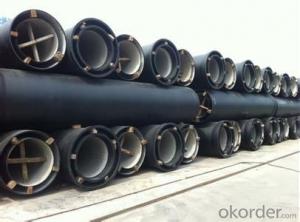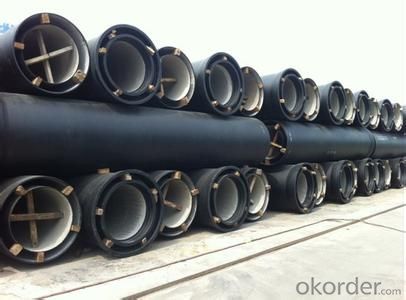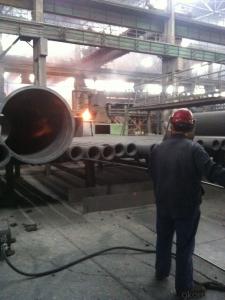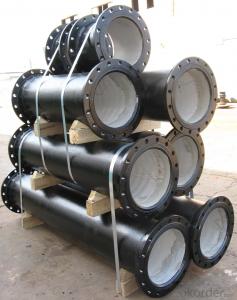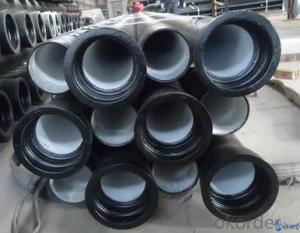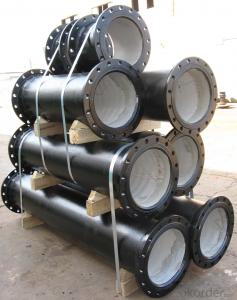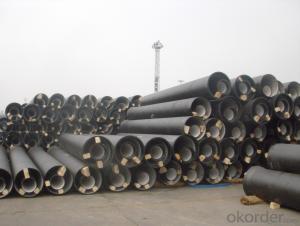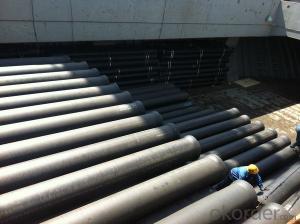DUCTILE IRON PIPES AND PIPE FITTINGS K8 CLASS DN800
- Loading Port:
- Tianjin
- Payment Terms:
- TT OR LC
- Min Order Qty:
- 22 pc
- Supply Capability:
- 3000 pc/month
OKorder Service Pledge
OKorder Financial Service
You Might Also Like
Material : Ductile Cast Iron
Size Range : DN 80mm to DN 2000mm
Unit Effective Length : 6m or 5.7m
Manufacture Standard: ISO 2531:1998/ EN 545:2006/EN 598:2007
Annual capacity : 200,000 tons
Coating Exterior: Zinc 130g/m2 according to ISO 8179-1 and bitumen coating 70 microns.
Cement Interior: Portland Cement/ High Alumina Cement/ Sulphate Resisting Cement Lining according to ISO 4179
Special requirements on external coating and internal lining can be applied
We also provide accessories such as SBR/EPDM rubber gaskets, lubricant paste, pipe caps, PE sleeves, etc.
Additional Parts:
Each pipe is strictly inspected according to related standard to ensure permanently high performance.
Easy Installation at site and service free for life
Long Service Lifespan
Quotation will arrive you within 24hours once we get your inquiry.
We guarantee offering you a competitive price.
A copy of original inspection reports of pipes will be offered after shipment.
Photos of loading process will be sent to the customer after shipment effect.
We will follow-up the delivery progress after shipment effect and update to the customer on weekly basis.
- Q: Are ductile iron pipes resistant to root intrusion?
- Ductile iron pipes are generally resistant to root intrusion, but not entirely immune. While the material itself is strong and durable, root intrusion can still occur through any cracks, joints, or damaged sections of the pipe. It is important to note that root intrusion is more common in older or poorly maintained pipes, where cracks or gaps may develop over time. However, modern ductile iron pipes are often coated with protective layers or linings to minimize the risk of root intrusion. Additionally, regular inspection and maintenance can help detect and address any potential issues before they escalate.
- Q: Principles for the antiseptic treatment of ductile iron pipes
- The principle that the antiseptic treatment of ductile iron pipes must be complied with is that.1. internal and external surface coating shall be kept clean, remove rust and impurities2. after coating on the inside and outside surface, the coating should be even and smooth, firm and firm, and shall not be abnormal because of climate change3. coating for water delivery should be insoluble in water, no peculiar smell, harmful impurities content
- Q: Can ductile iron pipe be used for water treatment plant sludge handling?
- Yes, ductile iron pipe can be used for water treatment plant sludge handling. Ductile iron pipes are known for their durability, strength, and resistance to corrosion, making them suitable for handling various types of wastewater and sludge. They can efficiently transport sludge from different stages of the water treatment process within the plant without any adverse effects.
- Q: Can ductile iron pipes be used in acidic environments?
- Yes, ductile iron pipes can be used in acidic environments. Ductile iron has excellent resistance to corrosion, including acidic conditions, due to its protective oxide layer. This makes it a suitable choice for applications in which exposure to acids is expected.
- Q: Water supply pipe is ductile iron, then it's fittings and valves and other parts must be ductile iron?
- The pipe material does not determine the valve material, the valve is generally based on several pressure temperature rating, medium condition and velocity, the valve must play a role as valve material, such as wear resistance, corrosion resistance, and so on,
- Q: How does ductile iron pipe compare to PVC pipe in terms of strength?
- Generally, ductile iron pipe is considered stronger than PVC pipe due to its composition of iron and carbon, which provides it with high tensile strength and resistance to breakage. It is commonly utilized in heavy-duty applications like water mains, sewer lines, and industrial piping due to its ability to withstand high pressures. On the flip side, PVC pipe is manufactured using a plastic material known as polyvinyl chloride. While PVC pipe is lightweight and easy to handle, it lacks the strength of ductile iron pipe. It is typically used in low-pressure applications such as household plumbing, irrigation systems, and drainage pipes. When comparing the strength of ductile iron pipe to PVC pipe, the former has a greater capacity to handle heavy loads, endure ground movement, and resist damage from external factors like rocks or tree roots. Additionally, ductile iron pipe is more durable and has a longer lifespan in comparison to PVC pipe. However, it is important to consider that the choice between ductile iron pipe and PVC pipe ultimately depends on the specific requirements of the project. Factors such as cost, environmental conditions, ease of installation, and desired longevity should all be taken into account when determining the appropriate type of pipe to utilize.
- Q: What are the differences between cast iron pipes W and A?
- W cast iron pipe is subdivided into W cast iron pipe and W1 cast iron pipe, the difference between them is the difference between the wall thickness. Because of the cold weather, the requirements for pipes are higher. The W cast iron pipes are mainly used in the north, while the W1 cast iron pipes are mainly used in the south.
- Q: What is the expected flow capacity of ductile iron pipes?
- The expected flow capacity of ductile iron pipes can vary depending on several factors such as the diameter and wall thickness of the pipe, the type of fluid being transported, and the specific design and condition of the pipeline system. Generally, ductile iron pipes are known for their high flow capacity due to their smooth internal surface which minimizes frictional losses. They are designed to handle a wide range of fluid flows, including water, sewage, and industrial fluids. In terms of specific flow rates, it is common to refer to the Manning's equation, which is widely used to calculate the flow capacity of open channels and pipes. This equation takes into account the hydraulic radius, slope of the pipe, and Manning's roughness coefficient to determine the expected flow capacity. However, it is important to note that the actual flow capacity can also be influenced by other factors such as the presence of fittings, valves, and bends in the pipeline, as well as any potential blockages or obstructions. Therefore, it is recommended to consult the manufacturer's specifications, engineering guidelines, or work with a qualified engineer to accurately determine the expected flow capacity of ductile iron pipes for a particular application.
- Q: How does ductile iron pipe handle ground movement and settlement?
- Ductile iron pipe is known for its excellent ability to handle ground movement and settlement. Due to its inherent strength and flexibility, it can withstand significant ground shifts without experiencing major damage or failure. One of the key features of ductile iron pipe is its high tensile strength, which allows it to withstand external forces and pressures. This strength enables the pipe to resist the effects of ground movement, such as soil settlement, subsidence, or shifting due to seismic activity. Moreover, ductile iron pipe has inherent flexibility, which allows it to absorb and distribute stress caused by ground movement. The pipe's flexibility helps to minimize the impact of settlement by allowing it to adjust and adapt to changes in the surrounding soil. This characteristic helps prevent the pipe from cracking, breaking, or leaking when the ground shifts or settles. Additionally, ductile iron pipes are often installed with flexible joints, such as push-on or mechanical joints, which further enhance their ability to accommodate ground movement. These joints provide a degree of flexibility and movement, allowing the pipe to adjust to changes in the soil without experiencing stress concentrations or structural failure. Furthermore, ductile iron pipe is highly resistant to corrosion, which is another important factor in its ability to handle ground movement and settlement. Corrosion can weaken pipes and make them more susceptible to damage during ground shifts. However, the corrosion-resistant properties of ductile iron help maintain the pipe's structural integrity and durability, even in challenging soil conditions. In summary, ductile iron pipe is well-suited to handle ground movement and settlement due to its high tensile strength, flexibility, and corrosion resistance. These properties allow the pipe to withstand external forces and adapt to changes in the surrounding soil, minimizing the risk of damage, leaks, or failure.
- Q: What is the expected joint performance of ductile iron pipes?
- Ductile iron pipes are widely recognized for their outstanding joint performance. They possess exceptional durability and strength, making them suitable for a wide range of applications, including water distribution, sewer systems, and industrial pipelines. One crucial aspect of joint performance in ductile iron pipes is their ability to withstand external loads and pressure. To ensure minimal leakage and long-term structural integrity, the joints in these pipes are designed to create a tight and secure connection. This is accomplished through the utilization of various joint types, such as push-on joints, mechanical joints, and restrained joints. Push-on joints are commonly employed in ductile iron pipes due to their ease of installation. They do not require any specialized tools or equipment. These joints rely on a rubber gasket, which guarantees a watertight seal and prevents leakage. On the other hand, mechanical joints involve the use of mechanical devices, such as bolts and nuts, to establish a rigid connection between the pipes. This type of joint provides additional strength and resistance against external forces. Ductile iron pipes have undergone extensive testing to ensure their performance meets or exceeds industry standards for pressure and bending strength. They exhibit high resistance to corrosion, resulting in a longer service life. Additionally, they are less susceptible to damage caused by ground movements or vibrations. These properties contribute to the overall joint performance of ductile iron pipes, ensuring reliable and efficient operation in various infrastructure systems. When properly installed and maintained, ductile iron pipes display remarkable joint performance. They provide a reliable and durable solution for numerous applications within the water and wastewater industry.
Send your message to us
DUCTILE IRON PIPES AND PIPE FITTINGS K8 CLASS DN800
- Loading Port:
- Tianjin
- Payment Terms:
- TT OR LC
- Min Order Qty:
- 22 pc
- Supply Capability:
- 3000 pc/month
OKorder Service Pledge
OKorder Financial Service
Similar products
Hot products
Hot Searches
Related keywords
